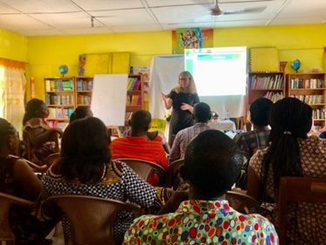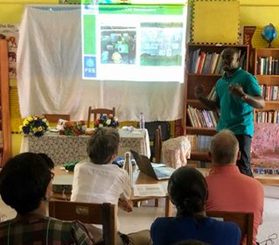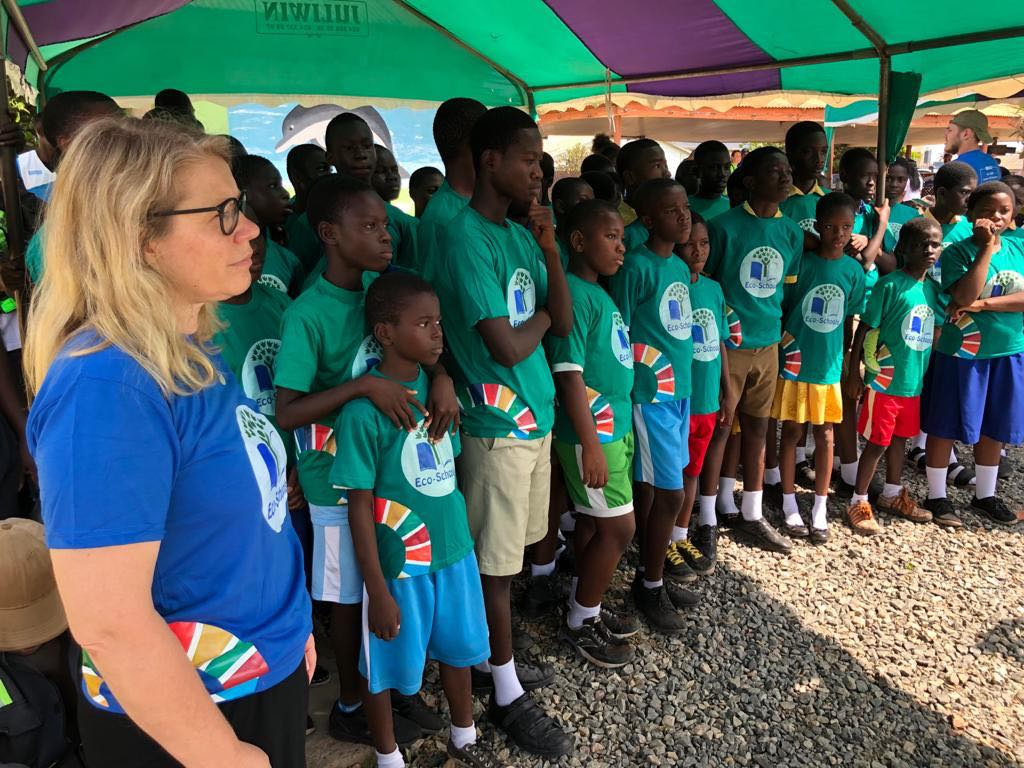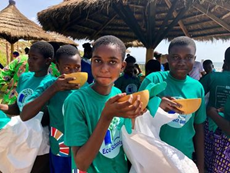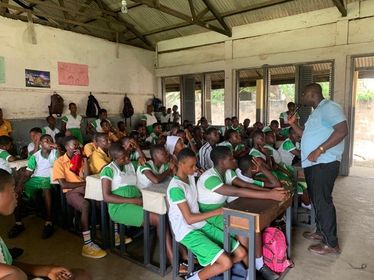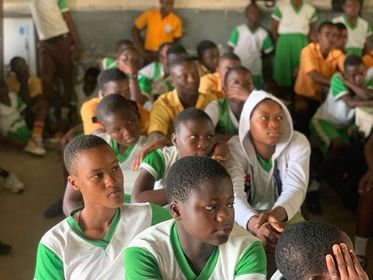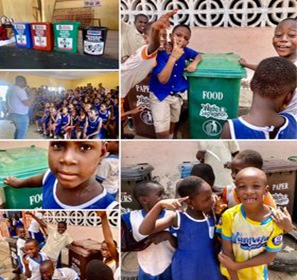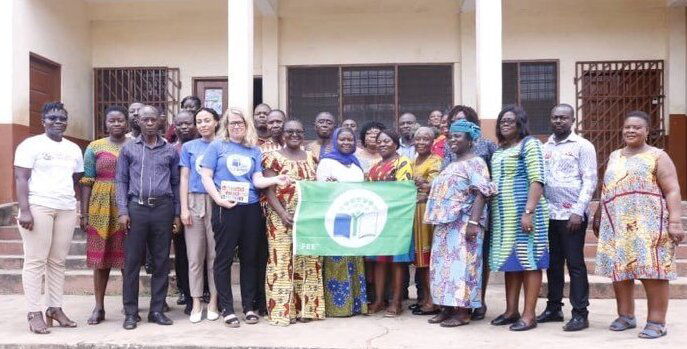
Waste-to-Resource
Eco-Schools Ghana, mission and vision of project
The Eco-Schools programme is global in scope and is one of Foundation for Environmental Education’s five programmes that CeST has the concession to run in Ghana.
Eco-schools were initiated in response to the Rio Conference on Sustainable Development in 1992 and is run on the principles of Education for Sustainable Development (ESD) encourages young people to engage in their environment by allowing them the opportunity to actively protect it through fun and action-oriented learning. The programme is run in schools with approval from Ghana Education Service and the Environmental Protection Agency. All Eco-Schools builds on a seven steps methodological framework for change, while the individual implementation programs are developed according to local context.
Eco-Schools Ghana has formally been operating in Ghana since 2014, although the 7-step methodology has been applied in some pilot schools since 2010. We find it to be open to innovative solutions based on the needs and possibilities at the individual school. The schools conduct their own audit on what measures are urgent to be adopted in their respective locations. However, all schools go through a gradual innovation program of waste separation that allows for development of school enterprises based on waste as a useful resource. For example, food waste becomes manure for the school garden, paper waste can be sold to the local toilet paper factory and be used as paper dough in art classes. All schools assigned to the program are required to do activities including the whole school, and do so. Some schools do however form Eco-School clubs where most activities are taking place.
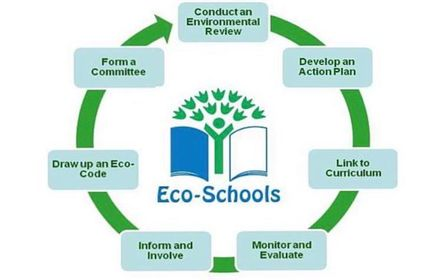
In 2019 Eco-schools Ghana has formed a partnership with Ghana Education Service (GES) and Jakora Ventures waste management company to introduce the Eco-school club in 67 schools within the Korley Klottey Municipality. The aim of the project is to empower young people in the schools to protect the environment focusing on waste management (segregation) and composting for school gardens in the first year and moving on to other activities thereafter.
Eco-Schools Ghana emphasizes the inclusion of all stakeholders in its approach, in particular at the local level. The aim is to raise students' awareness of sustainable development issues beyond the classroom and encourage school and community action via the annual 7-step implementation process to help students, schools and local communities identify a problem(s), develop action plans, implement them, and audit results.
1. The collaboration with Jekora and GES
Eco-schools Ghana has been working with a number of schools within different regions in Ghana to promote education for sustainable development by training young children to become active change makers in society through the Eco-schools seven step methodology.
In the last quarter of 2019, Eco-schools signed up an MOU with the waste company Jekora Ghana limited, a waste management company in charge of collecting waste within ‘Korley Klottey’ , a constituency in the Accra Metropolitan Assembly to work together in the schools where they operate to sensitize students on the environment with a focus on waste management (waste segregation). Korle Klottey Municipality is one of the 260 Metropolitan, Municipal and District Assemblies (MMDAs) in Ghana, and forms part of the 29 MMDAs in the Greater Accra Region. The main objective of the project is through hands on learning educate students on Waste-to-Resource through innovations and art work, to better understand the principles of a circular economy. By reaching schools students most households in the district is directly or indirectly updated on new waste management practices.
There are a total of 67 public basic and junior high schools within the constituency and according to the MOU, Eco-schools have been given access to work in all the schools. The two parties have agreed on two separate roles where Jekora Ghana ltd introduces waste bins and knowledge on how to use them while Eco-schools provides the background information on the importance of segregating their waste among other activities.
To further solidify our grounds, Eco-schools Ghana has also obtained an agreement with the Ghana Education Service (GES) to work in these schools and thus working hand in hand with the circuit supervisors within the constituency.
In February 2020, together with Jekora , Eco-schools Ghana visited all the 67 schools introducing the Eco-schools programme and how we intend to run it in the schools. Prior to this, Eco-schools Ghana had held a training workshop for ‘teacher coordinators’ within the schools on the programme and what their role will be. There were two teachers from each school who will be the main coordinators in the schools working together with the students and the Eco-schools team to run our activities in the schools.
Partnership with UNDP
As part of the school programme, Eco-schools Ghana has partnered with UNDP Ghana to work together in the 67 schools. Eco-schools Ghana is a member of the communication and advocacy sub-platform for the UNDP Ghana waste management platform and is there,represented by our national coordinator. The agreement with UNDP-Ghana is to jointly create presentation materials to be used for sensitization within the schools. This in part also promotes the agenda of the waste management platform to create environmental awareness in schools. In view of this, the Eco-schools team organized a training workshop for 20 National service personnels from UNDP-Ghana on the Eco-schools programme and our seven step methodology. The sensitization within the schools would be done together with the service personnels every year.
3. The thematic meeting with the Principals
In October 2019, Eco-Schools Ghana team met with the 4 circuit supervisors with their divisional head for the 67 basic schools in Korley Klottey at a meeting arranged by Jekora Ventures on their premises where the Eco-school club idea was introduced to them. This was followed by another meeting in the first week of November with 31 school heads within Adabraka. The Circuit Supervisors acknowledged their interest in the club and agreed to collaborate and support its running within the schools. As a first step, the circuit supervisors agreed to arrange for selected students from all 67 schools in the Korley Klottey municipality to join our beach cleanup with UN in Ghana for the UN day celebration on 25th October an event organized by our partner NGO Plastic Punch.
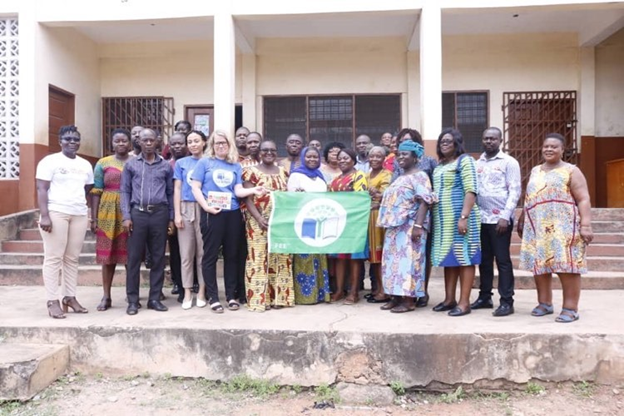
4. The Introduction with the network of teachers
In January, 2020, Eco-schools Ghana organised a training session for the teachers within each of the 67 schools in Korley Klottey. The training session introduced the Eco-schools club and our 7 step methodology to the teachers and covered extensively environmental pollution with focus on plastic and how the teachers and students can help solve the problem. In all, 2 teachers were expected from each school however, only 20 teachers were able to attend the training due to a reshuffling by GES among staff of the schools at the same time, hindering planning and organising strategies. Eco-schools however, created a platform for all the teachers where information from the workshop was shared online.
Each teacher received an amount of GHS 50 (GHS 1000 in all) to cover transportation for attending the meeting and an extra GHs 200 was spent on refreshment.
|
|
5. Beach cleanup exercise (UN day)
On 25th October 2019, Eco-school Ghana partnering with Jekora Ventures, Plastic Punch and UN in Ghana organised a beach cleanup activity at the Laboma beach in Accra in commemoration of the UN day on 24th October. Over 50 students were selected from our schools in Korley Klotey together with the Eco-schools team to partake in this activity. Ecoschools Ghana held a brief talk with the students on the reasons for the clean-up and why we must keep our oceans from pollution. All refreshment was served in reusable containers and local wood bowls to emphasize the importance of responsible consumption and circular economy.
| 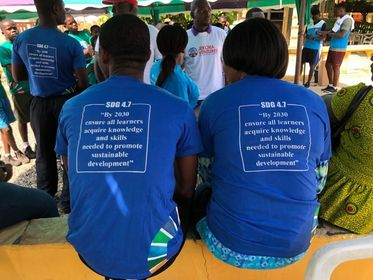 |
| 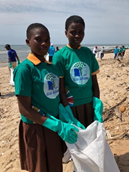 | 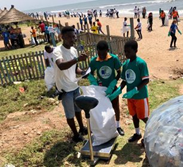 |
6. Step by step explanation of the training together with Jakora at the individual schools
From the 20th January, to 5th February 2020, Eco-Schools together with Jekora Ventures carried out a waste management sensitization program in the 67 schools within the Korley Klottey municipality. As part of the program, Jekora Ventures introduced waste bins to the students, teaching the various waste that must go into each separate bin while Eco-schools taught on why it is important to segregate the waste. Four coloured bins were introduced to students (Blue,Red, Green &Black). The blue bins were for plastic waste,the red for paper waste, green for food waste and black for general waste. All types of plastics as long as they were not soiled, are to go into the blue bin, the papers included leaflets, old exercise books,manila cards and all papers used in the classroom. Food waste must be rinsed carefully and placed in the green bin while other waste like canned drink containers and non-recyclable waste were to go into the general bin. Also, used tissues and other toiettory waste were to be wrapped tightly in multiple bags and placed in the general waste bin. Eco-schools then introduced the students to the reasons why their waste must be segregated and spoke on recycling into alternative products and composting. Eco-schools further spoke on forming the Eco-school clubs in all the schools using our 7 step methodology and awarding the green flag to schools who achieve their laid down objectives.
Waste from the schools are being picked up every other Wednesday and Friday by Jekora Ventures and taken to their recycling center for pre-processing and then sold for further recycling.
|
|
|
|
7. What has the project achieved - what is the anticipated outcome?
So far the project has been able to sensitize the students on waste segregation and its importance. Over 1000 students have been reached from the 67 schools and agreements have been made to begin the Eco-School clubs in the schools where we will work further on the Waste-to-Resource approach, and ultimately reduce hazardous waste such as plastics, starting with 10 schools per academic term.
8. The plan going forward
Eco-schools' next planned action is to seek acceptance to visit the schools once a month with a theme on the "why it is important to segregate" waste. We will try to link this to other relevant events, such as the world environment day, the day of the ocean etc. Based on the size of our collective team, we are only able to visit 40 schools in a month.
As part of the overall plan, we would also start establishing an Eco-Schools club in some schools starting with ten schools when schools resume for the next term. The school clubs will be run basically by the students with support from their teacher coordinators and the Eco-schools team. The children would follow the seven step methodology to form a committee, conduct an environmental review, develop an action plan, link it to the school’s curriculum, monitor and evaluate, involve the entire school and community and finally come up with an Eco-code for the school. At the end of each year the most successful and sustainable schools would be awarded a green flag certification and would be evaluated every other year.
Currently with the emergence of the coronavirus, all schools are closed in the country and would resume in January, 2021. This has put a temporary hold on the full commencement of our activities in the schools. Eco-schools Ghana has, however, taken the opportunity to run stay at home activities with some of our schools using WhatsApp platforms where students share biodiversity around them as well as innovations they are coming up with while at home.
As we are preparing for the re-opening of the schools in January we are in the process of developing new material, and have also partnered with Eco-Lab – which provides a high-tech 3D printing of plastic waste into new useful items as another activity to focus waste as a resource as well as advancing the discussion on plastic free schools.
We are also working with an investor and business entity working on biodegradable plastics aimed at replacing the use of conventional plastic bowls/Styrofoam packages for school meals.
